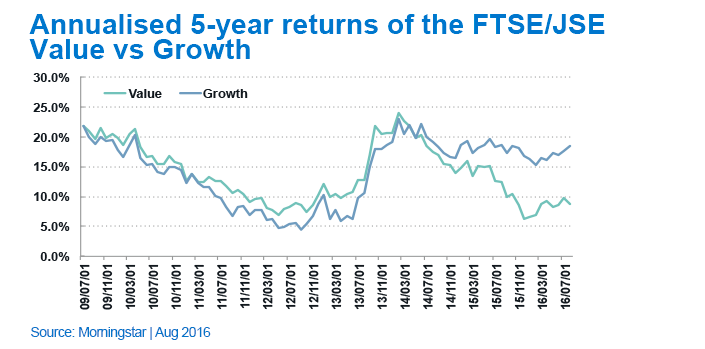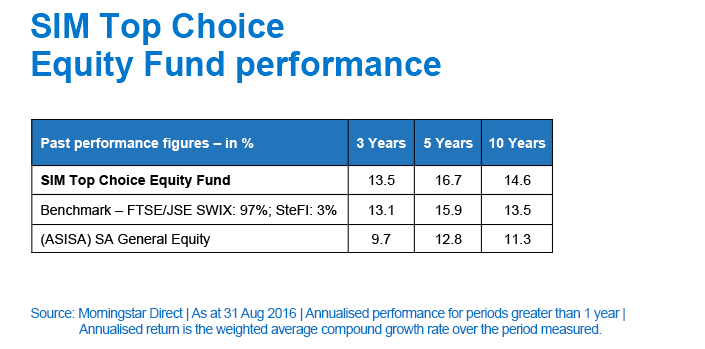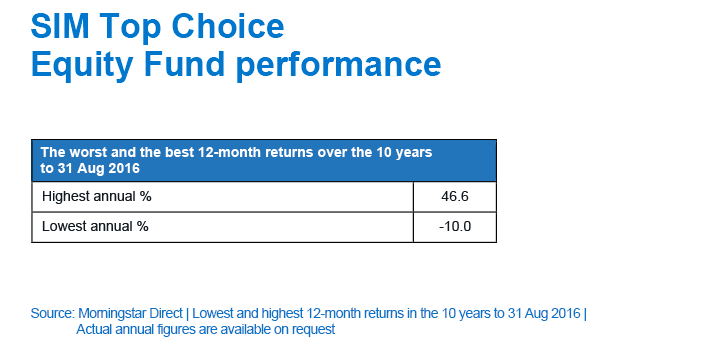Long-term performance: Are 5 years enough?

It used to be safe to tell clients to compare the performance of equity funds over three to five years, but it seems this yardstick needs to be rescaled. For example, comparing value and growth managers over periods shorter than three years used to be considered unfair, as each style has its season. But the value-growth-cycle appears to have lengthened. Has a ten-year measurement period become the new fair measure…?
The JSE’s indices for the Value style and Growth style only date back to July 2004, but still provides some insight into the length of the latest performance cycles. The last time investors in the Value style outperformed investors in the Growth style over a three-year period, would have been if they both invested a lump sum at the end of April 2010. And that was by a slight margin and only briefly before Value rapidly started lagging Growth again. And over a four-year period, the last time the Value style outperformed Growth was from the end of November 2009 to the end of November 2013. That was a brief and hairbreadth victory too.
Although the cycle is starting to turn for Value investors, even those with a five-year investment horizon has not tasted victory yet. According to the data available for the past 12 years, the last time a Value investor outperformed a Growth investor over a five-year period, would have been if he or she invested a lump sum at the end of March 2009!

Perhaps five years are too short to evaluate a fund’s performance if the particular investment style of that fund manager is caught in the ebb tide. It is therefore no surprise that the Financial Services Board recently issued a notice that all unit trust performance figures published must include the 10-year performance for that fund – unless of course it hasn’t been in existence that long.
Our boldest fund is celebrating its 10-year anniversary
In the light of the importance Sanlam Investments attach to a 10-year track record, we are delighted that our most concentrated equity fund, the Sanlam Investment Management (SIM) Top Choice Equity Fund has reached the 10-year milestone. The fund, managed by Patrice Rassou, captures the highest conviction shares of 12 equity managers within the SIM investment house, managing investors’ money according to its long-standing pragmatic value philosophy. This is SIM’s ‘best ideas’ fund.
The SIM Top Choice Equity Fund is not a high-churn fund; the average holding period of the shares in the fund was 36 months at the end of June and it’s been holding eight of these shares for at least five years. MTN has been held since the inception of the fund.
The long-term performance of this fund has been exceptional, particularly in the light of the long stint of underperformance of value managers. It’s been a top quartile performer over the past three, five and ten years to 31 August 2016.

Bear in mind that this concentrated portfolio, by its nature, cannot be benchmark cognisant and performance can therefore deviate significantly from the benchmark over the short term. It is a high-risk fund, which will display price volatility over the short term. It is long-term performance, though, at which the portfolio manager takes aim. And he has the track record to prove this.

Mandatory disclosure:
All information and opinions provided are of a general nature and are not intended to address the circumstances of any particular individual or entity. We are not acting and do not purport to act in any way as an advisor or in a fiduciary capacity. No one should act upon such information or opinion without appropriate advice after a thorough examination of a particular situation. We endeavor to provide accurate and timely information but make no representation or warranty, express or implied, with respect to the correctness, accuracy or completeness of the information or opinions. Any representation or opinion is provided for information purposes only. Unit trusts are generally medium to long-term investments. Past performance of the investment in no guarantee of future returns. Unit trusts are traded at a ruling price and can engage in borrowing and scrip lending. Sanlam Investments consists of the following authorised Financial Services Providers: Sanlam Investment Management (Pty) Ltd (“SIM”), Sanlam Multi Manager International (Pty) Ltd (“SMMI”), Satrix Managers (RF) (Pty) Ltd, Graviton Wealth Management (Pty) Ltd (“GWM”), Graviton Financial Partners (Pty) Ltd (“GFP”), Radius Administrative Services (Pty) Ltd (“Radius”), Blue Ink Investments (Pty) Ltd (“Blue Ink”), Sanlam Capital Markets (Pty) Ltd (“SCM”), Sanlam Private Wealth (Pty) Ltd (“SPW”) and Sanlam Employee Benefits (Pty) Ltd (“SEB”), a division of Sanlam Life Insurance Limited; and has the following approved Management Companies under the Collective Investment Schemes Control Act: Sanlam Collective Investments (RF) (Pty) Ltd (“SCI”) and Satrix Managers (RF) (Pty) Ltd (“Satrix”). Although all reasonable steps have been taken to ensure the information in this document is accurate, Sanlam Collective Investments (RF) (Pty) Ltd (“Sanlam Collective Investments”) does not accept any responsibility for any claim, damages, loss or expense; however it arises, out of or in connection with the information. No member of Sanlam gives any representation, warranty or undertaking, nor accepts any responsibility or liability as to the accuracy of any of this information. The information to follow does not constitute financial advice as contemplated in terms of the Financial Advisory and Intermediary Services Act. Use or rely on this information at your own risk. Independent professional financial advice should always be sought before making an investment decision. Sanlam Group is a full member of the Association for Savings and Investment SA (ASISA). Collective investment schemes are generally medium- to long-term investments. Please note that past performances are not necessarily an accurate determination of future performances, and that the value of investments may go down as well as up. A schedule of fees and charges and maximum commissions is available from the Manager, Sanlam Collective Investments, and a registered and approved Manager in Collective Investment Schemes in Securities. The maximum fund charges include (including VAT): An initial advice fee of 3.31%; initial manager fee of 1.25%; annual advice fee of 1.14% and annual manager fee of 1.02%. The most recent total expense ratio (TER) is 1.56%. Additional information of the proposed investment, including brochures, application forms and annual or quarterly reports, can be obtained from the Manager, free of charge. Collective investments are traded at ruling prices and can engage in borrowing and scrip lending. Collective investments are calculated on a net asset value basis, which is the total market value of all assets in the portfolio including any income accruals and less any deductible expenses such as audit fees, brokerage and service fees. Actual investment performance of the portfolio and the investor will differ depending on the initial fees applicable, the actual investment date, and the date of reinvestment of income as well as dividend withholding tax. Forward pricing is used. The Manager does not provide any guarantee either with respect to the capital or the return of a portfolio. The performance of the portfolio depends on the underlying assets and variable market factors. Performance is based on NAV to NAV calculations with income reinvestments done on the ex-div date. Lump sum investment performances are quoted. The portfolio may invest in other unit trust portfolios which levy their own fees, and may result is a higher fee structure for our portfolio. All the portfolio options presented are approved collective investment schemes in terms of Collective Investment Schemes Control Act, No 45 of 2002. International investments or investments in foreign securities could be accompanied by additional risks such as potential constraints on liquidity and repatriation of funds, macroeconomic risk, political risk, foreign exchange risk, tax risk, settlement risk as well as potential limitations on the availability of market information. The Manager has the right to close any portfolios to new investors to manage them more efficiently in accordance with their mandates. The portfolio management of all the portfolios is outsourced to financial services providers authorized in terms of the Financial Advisory and Intermediary Services Act, 2002. Standard Bank of South Africa Ltd is the appointed trustee of the Sanlam Collective Investments Scheme.





Comments are closed.